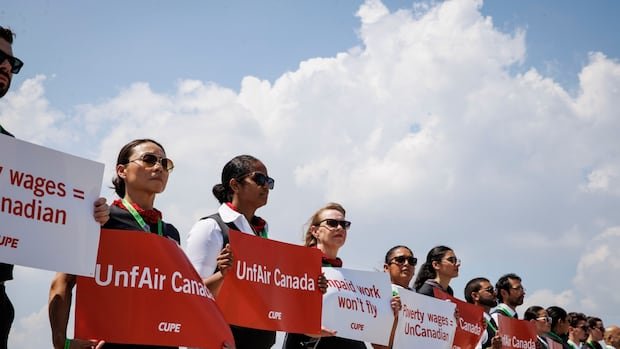In a recent development, the labor union representing Air Canada’s flight attendants managed to resolve a contract dispute with the airline, effectively ending their strike. The core issue revolved around the flight attendants’ push for compensation for ground pay, encompassing work activities before boarding and after landing.
Julia Smith, an associate professor specializing in labor studies at the University of Manitoba, hailed this agreement as a significant milestone. She emphasized that the inclusion of ground work compensation sets a precedent for future labor negotiations within the aviation industry.
The majority of flight attendants in Canada, approximately 80%, are women. Smith highlighted the enduring influence of historical gender bias on how their roles are perceived. This bias results in flight attendants striving to be recognized as safety professionals and seeking acknowledgment for their contributions, both from the public and their employers, especially concerning fair wages.
Gender bias leading to unpaid work is not exclusive to the airline sector. Experts, including Smith, note a similar trend in fields dominated by women, such as healthcare, caregiving, and education. These industries often impose expectations rooted in long-standing gender stereotypes on their female workforce.
Smith explained that unpaid labor manifests in various forms, from overt instances like the Air Canada dispute to subtler scenarios where workers voluntarily undertake extra responsibilities. For instance, Gloria Cardinal-Tan, a senior registered nurse at St. Michael’s Hospital in Toronto, shared how her workload surge over the past five years has compelled her to extend her shifts to fulfill all tasks, impacting her emotional and physical well-being.
Similarly, Dottie Irvine, a kindergarten teacher in Etobicoke, Ontario, highlighted the unpaid efforts educators invest outside regular hours to create a conducive learning environment for students. Despite these additional duties not being contractually mandated, Irvine emphasized their importance in fostering a safe and engaging school atmosphere.
The lack of adequate funding in these sectors is a key factor contributing to the prevalence of unpaid work. Cardinal-Tan advocates for increased funding and mandatory nurse-to-patient ratios to alleviate the burden on healthcare workers. Armstrong stressed the need to value and fund care work adequately, emphasizing its contribution not only to the workers but also to society as a whole.
The recent labor dispute involving Air Canada’s flight attendants has sparked broader discussions on unpaid work issues. Smith expressed optimism that this dialogue will prompt workers in other sectors to address similar concerns during future bargaining rounds.


